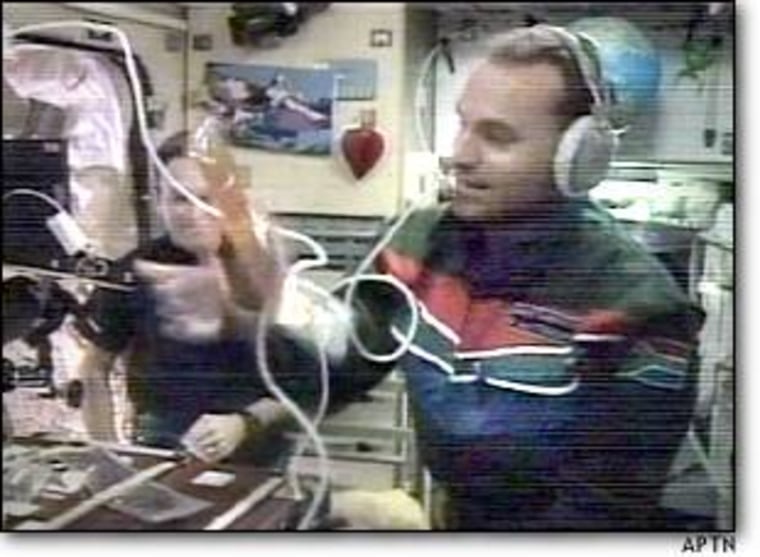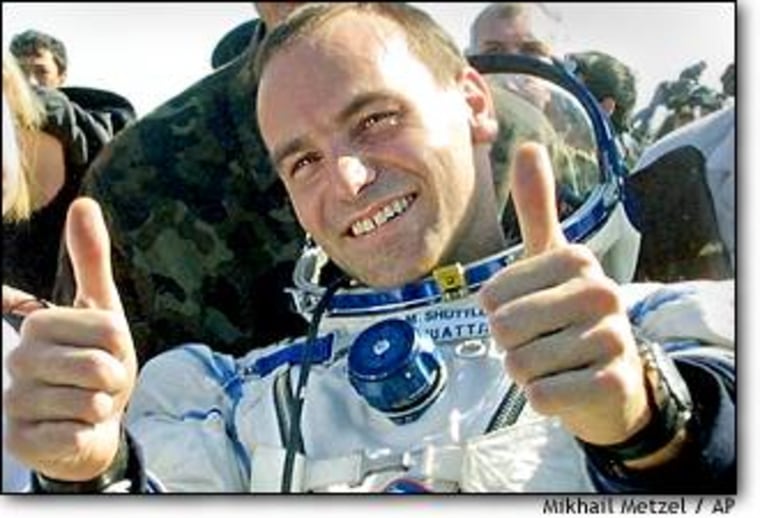Mark Shuttleworth, who paid his own way to become the first African in space, says his flight to the international space station yielded personal thrills as well as potential scientific dividends. Shuttleworth told NBC’s “Today” show on Monday that he believes space officials are becoming increasingly open to the opportunities made possible by privately funded flights like his 10-day, multimillion-dollar trip.
Shuttleworth's voyage, which began April 25 and ended May 5 on the barren steppes of Kazakhstan, made him the world’s second paying space passenger. The 28-year-old Internet entrepreneur reportedly paid $20 million for his training and trip — about the same fare paid a year earlier by California millionaire Dennis Tito for his unprecedented flight.
The Russians need those eight-figure infusions of private-sector cash to keep their space program alive.
Shuttleworth’s flight generated far less controversy than Tito’s, and the South African told NBC that he sensed NASA was becoming far more comfortable with the concept of privately funded space flight.
“My sense was that there’s now good momentum toward at least working with space flight participants that have come to the party along a different track,” he said, “and that people within NASA are excited about the possibilities that that might open up for the agency and for the future of space exploration.”
When asked to name the high point of his flight, Shuttleworth replied that “from a sheer adrenaline point of view, the re-entry in the Soyuz capsule was almost unbelievable.”
“All of us were shaken and stirred, but thoroughly excited,” he told NBC’s Katie Couric.
The amateur rode back and forth from the station on a Russian Soyuz capsule in the company of two professionals, Russian commander Yuri Gidzenko and Italian pilot Roberto Vittori. Shuttleworth said all three of the crew members had a rough couple of days after their landing.
“It was certainly more comfortable to adapt to space than it was to adapt back to being on the earth,” he said. One of the toughest adjustments had to do with regaining a sense of gravity-tuned balance after spending 10 days in weightlessness.

“Your legs know what they should do, but they just seem to be unable to get it all right in the right sequence,” Shuttleworth said. It took two or three days on Earth for him to feel “100 percent,” he said.
The primary aim of the space mission was to deliver a fresh Soyuz escape capsule to the space station. Such “taxi flights” have to be made every six months as a safety precaution — but they also afford opportunities to take along trained passengers for the ride.
During his stay, Shuttleworth conducted experiments on sheep embryos and stem cells, and on HIV protein crystallization. His health was monitored to study the effects of space flight, and he also sponsored an educational effort called “Hip to Be Square,” aimed at heightening interest in math and science among South African students.
On Monday, Shuttleworth said the experiments with stem cells and embryos just might yield useful results months from now.
“We learned late last week that (scientists) managed to retrieve all of the samples and find some cells that have grown entirely in space,” he said on NBC. Those cells would be compared with cells grown on Earth in an effort to develop further avenues for biological research in zero-gravity, he said.
Because of his scientific and educational work, Shuttleworth maintained that he shouldn’t be considered a “space tourist.” His efforts turned skeptics into supporters, and on Monday he observed that the fruits of his flight were well received in South Africa.
However, the millionaire wasn’t above bringing home at least one memento with him: the spacesuit he wore during the trip. He tried to buy the Soyuz landing craft as well — a capsule he nicknamed “Betty” — but the Russians turned him down, saying they couldn’t sell such equipment to a South African citizen.
Shuttleworth has said he wouldn’t mind taking another flight into space.
“It was just the most extraordinary experience,” he said Monday, “not just the flight but the last eight months of the buildup.”
The next manned Soyuz flight, scheduled for launch in late October or early November, already has several would-be candidates for the passenger seat, including ’NSync singer Lance Bass, former NASA official Lori Garver and Polish businessman Leszek Czarnecki. The Russians are expected to name their choice sometime in May.
